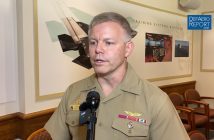Tone Skogen, Norway’s deputy defense minister, discusses lessons learned from NATO’s 31-nation Trident Juncture 2018 military exercise simulating an Article V defense of member nation in norther Europe, Russia’s behavior during the exercise and Moscow’s recent seizure of Ukrainian vessels and their crews, and the collision that sank the Norwegian frigate Helge Ingstad with Defense & Aerospace Report Editor Vago Muradian during the Reagan National Defense Forum at the Ronald Reagan Presidential Library in Simi Valley, Calif. Our coverage was sponsored by L3 Technologies and Leonardo DRS.
Deputy Defense Minister Tone Skogen
Norway
Reagan National Defense Forum
November 2018
Vago Muradian: Welcome to the Defense and Aerospace Report. I’m Vago Muradian here at the Reagan National Defense Forum at the Ronald Reagan Presidential Library in Simi Valley, California, one of America’s premier security gatherings with military, political, economic, industry, and thought leaders from around the world. Our coverage here is sponsored by Leonardo DRS and L3 Technologies.
We’re honored to be talking to Norway’s Deputy Defense Minister Tone Skogen. Thanks so very much for joining us. You got here not very long ago. You’ve had a very, very action-packed day before you’re going to go to Washington and spend a little bit of time there before heading back home.
I want to ask you first, Trident Juncture was an extraordinary exercise, biggest NATO exercise since the Cold War. It was an Article 5 test where the alliance comes together to protect a northern state from aggression, without mentioning any specific countries that may be involved. And it involved all 29 NATO Nations as well as Sweden and Finland. So the Swedes were coming not in an invasion capacity, but in an allied and friendly capacity. Just a little bit of a local joke there, which fell somewhat flat.
But talk to us a little bit about what were some of the lessons learned? How did it go? How is it going to shape in part how Norway approaches defense in the future, and territorial defense, but also how the alliance is going to think through some of the defensive challenges, given the complexity of the environment, especially the defense of a country under fire, for example?
Deputy Defense Minister Tone Skogen: As you said, it was a very big exercise. And of course for Norway, also a very big operation as the host nation. We were quite pleased to see, for instance, the very substantial contribution from the U.S. and it has been over 20 years since the last time we saw a U.S. carrier, for instance, off the coast of Norway. But this was all very well received.
In terms of what we learned or the take-away, to begin with, of course this was a very good opportunity to test our own national defense plans. Also, hopefully, this was a very good occasion for NATO as an alliance to understand better the importance of the [Nordic] flank. It was also a good occasion, and I think it was very successful in proving, demonstrating NATO unity which of course is important by itself, and to demonstrate credible coordinated deterrence.
Furthermore, many people, many nations training, exercising together in different climates, taking away lessons, how you could improve the operational capacities and be even more efficient in operating together.
So I think all in all, many good lessons learned. Presently the exercise is being evaluated both by NATO and also by ourselves, so it’s a little early to be too precise as to where you need to improve, but overall, a very successful, very positive and good exercise.
Mr. Muradian: We recently talked to Sweden’s Supreme Commander, Michael Bydén, and one of the things he told us was logistics was very, very important. Right? That was a key lesson from Aurora, which you participated in as well, which was Sweden’s big wargame last year.
Dep. Defense Minister Skogen: Uh-huh.
Mr. Muradian: And of course Sweden participated in it. Do you think that logistics was one of the big key lessons that came from this? Especially to be able to support units under fire?
Dep. Defense Minister Skogen: Well, that’s one of them, but I think there were many things learned. But this was also very well prepared. There were no big surprises underway, at least as far as I have been informed about. But I mean logistics is always important, and most aspects can always be improved. So that’s why also the evaluation presently going on will be important to actually point to where are some of the weaker points where we really need to improve.
Mr. Muradian: Let me ask you about Russia’s behavior. There was a lot of reporting about Russia jamming GPS signals. We talked to Lithuania’s Defense Minister Raimundas Karoblis and he said, you know, it was surprising that the Russians — what was confusing, he said, was the Russians were not more active. Sometimes they’ll try to interfere a little bit more and were a little bit more active.
From your perspective, how serious was what Russia did in terms of jamming signals in the region, which does stand the potential of jeopardizing aircraft? And then there were a few proximity incidents as well that we discussed.
How would you characterize Russia’s behavior during that exercise?
Dep. Defense Minister Skogen: In general the Russian behavior was what we expected it to be. I mean basically, you would always expect Russia to follow an exercise like that quite closely. I mean like we would follow a Russian exercise as well.
From the Norwegian side, we have been very open, very transparent, informative about the exercise. We have spent a lot of effort and used all available channels to inform the Russians about the exercise. And we actually also sent civil servants from the Ministry of Defense to Moscow last February, basically to inform about the exercise hoping that it would help take away some of the misinformation. And actually, we have also received positive feedback from Russian representatives. That doesn’t necessarily mean that their published statements are in accordance with us. But all this is to be expected.
As you said, we did experience jamming, making it difficult for the civil aircraft because the GPS was affected. This probably was also part of what could be expected. A couple of incidents, yes. These were all being informed about, according to procedures. Only one of them took place. But I mean it was an incident of a kind that it didn’t hamper the exercise as such. And what the Russians did was, again, it was, had been notified so we were aware that it would happen.
But in general, the Russian reactions were pretty much what you would expect them to be.
Mr. Muradian: Russia has since seized Ukrainian vessels in the Sea of Azov in the Kerch Strait, and Secretary Mattis was very, very direct and called Vladimir Putin a slow learner. He said all of Putin’s actions are actually bringing the alliance closer, increasing defense spending and further isolating Russia.
What are some of the lessons as a country that borders with Russia, that prides itself on having a good working relationship with Russia, at the same time always looking to protect itself from potential miscalculation or Russian action? From a Norwegian perspective, how do you regard what happened in Ukraine and what it tells you about sort of the future of the relationship between NATO, Norway and Russia?
Dep. Defense Minister Skogen: Well, our reaction was basically the same as you have seen from other allies. I mean supporting Ukraine and stating that the Russians should respect international treaties, international law, and should free the ships and the sailors. So I mean that has been our reaction to this.
Being a neighbor to Russia, I think we see or have been seeing in the last few years a stepping up of activity. They have improved their forces. They have new capacities. They have been more active. It’s fair to say more aggressive as well. So we see an increased activity, and of course, it’s fair to say this is also a concern.
So there was no comparison, of course, to what happened to Ukraine, but the fact that you have a consistently active and more aggressive Russia is part of the [same].
Mr. Muradian: Let me take you to the question of the relationship between the United States and Norway. Every year there’s a new set of priorities. We’re looking at a new year. What are some of the cooperative priorities from your perspective with Washington that you’re going to be discussing with your American colleagues?
Dep. Defense Minister Skogen: Well, in general, we have a very good bilateral relationship. Needless to say, the U.S. is the most important ally, and of course also a very good friend. We go back many, many years and we cooperate not only within defense and security but basically in all areas.
We have a very close relationship when it concerns, for instance, the maritime area, intelligence, surveillance. We have just seen a doubling of the U.S. Marines in Norway, stepping up from some 300 to close to 700. Very much welcome. We also have a very extensive bilateral cooperation in the defense industry. We work closely together on that. We are of course now acquiring both
P-8s and F-35s, bringing us even closer together, cooperating on that. And we share, of course, overall information and assessments, developments and challenges.
So all in all, the relationship is a very good one, a very strong one, and very much appreciated.
Mr. Muradian: And the very last question on the frigate. Norway prides itself on having some of the best frigates in the world. There was a very unfortunate accident that led to the sinking of one of your frigates, which was part of Trident Juncture, actually, was a collision with a tanker. I know there’s been a preliminary report out. What can you tell us about what happened, and what’s going to happen in terms of the salvaging of the ship and returning her back into service?
Dep. Defense Minister Skogen: I can only tell you what the preliminary report stated, which points to there being potentially a lot of unfortunate incidents, more or less coincidently, at the same time. So more work needs to be done, more analysis, more investigation will be carried out before we have the answers to all the questions.
We are now in the process of hopefully trying to rescue the frigate and bring it back to the base. That will enable us to have a better assessment of the damages and to what extent it is actually feasible to repair the ship or what the alternative might be. But that is too early at this stage to have a very definite opinion on that.
Mr. Muradian: Tone Skogen, Deputy Defense Minister for Norway. Thank you so much. I really appreciate it.
Best of luck, and best of luck in getting the ship back into service. It was a beautiful ship.
Dep. Defense Minister Skogen: Thank you.
30




